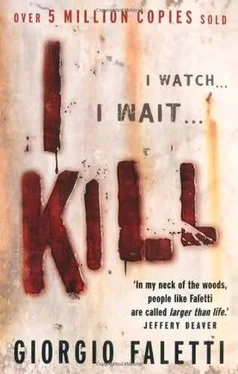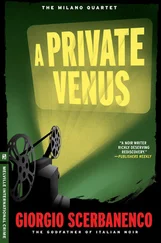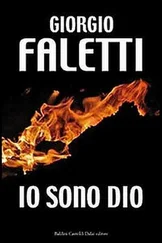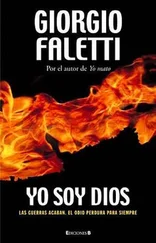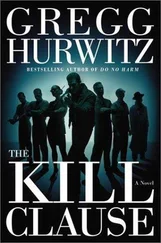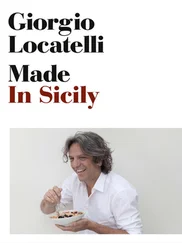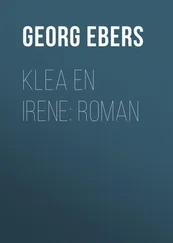‘I’m sorry we woke you, Pierrot, but we need your help for something important. You’re the only one who knows how to do it.’
The woman relaxed. The man’s face might be frightening, but his voice was calm and gentle. Pierrot was not afraid of him in the least. Actually, he was proud about that unexpected nocturnal adventure, the trip in the police car, and liked being the centre of attention for once. She felt a sharp stab of love and protectiveness for that strange son of hers who lived in a world all his own, made of music and pure thoughts.
‘We’re going to play some music for you, a song,’ the younger man continued in his soothing voice. ‘Listen to it. Listen carefully. See if you recognize it and if you can tell us what it is or what record it’s from. Want to try?’
Pierrot was silent. Then he gave a slight nod.
The man stood up and pressed the button on a tape recorder behind him. The notes of a guitar suddenly pierced the air. The woman observed her son’s face, taut with concentration, engrossed in listening to the sound from the speakers. The music ended a few seconds later. The man crouched down next to Pierrot again.
‘Do you want to hear it again?’
The boy shook his head silently.
‘Do you recognize it?’
‘It’s there,’ Pierrot said softly, turning his eyes to Bikjalo as if he were the only person who mattered.
‘You mean we have it?’ The manager came closer. Pierrot nodded again, with emphasis.
‘It’s there, in the room.’
‘What room?’ asked Hulot, coming near.
‘The room is the archive, downstairs in the basement. That’s where Pierrot works. There are thousands of records and CDs and he knows each and every one of them.’
‘If you know where it is in the room, can you go and get it for us?’ Frank asked gently. He was desperate not to press him too hard.
Pierrot looked at the manager again, as if asking permission. ‘Go on, Pierrot. Bring it here, please.’
Pierrot got up and crossed the room with his odd loping gait. He disappeared from view, followed by his mother’s worried gaze.
Inspector Hulot went up to her. She recoiled with shame at the cheap dress she had hurriedly pulled on over her nightie.
‘Madame, excuse me again for the brutal way in which we woke you and brought you here. I hope you weren’t too frightened. You can’t imagine how useful your son could be tonight. We are truly grateful to you for allowing him to help us.’
Now her momentary embarrassment melted into a surge of pride for her son.
Pierrot returned a few minutes later. He was holding a somewhat worn record sleeve under his arm. He placed it on the table and removed the vinyl record with extreme care to avoid touching it with his fingers.
‘Here it is,’ said Pierrot.
‘Can we hear it, please?’ asked the younger policeman with his thoughtful voice.
The boy went over to the stereo, handling it like an expert. He pressed a couple of buttons, raised the lid, and put on the record. He pushed PLAY and the turntable began to spin. Then he delicately took the arm and rested it on the LP. The notes that played were the same ones that an unknown man had sent them a little while before, daring them to put a stop to his wanderings through the night.
There was a moment of general euphoria. Everyone found a way of applauding Pierrot’s small personal triumph as he turned around with an innocent smile. His mother looked at him with a dedication in her eyes that his success could only partly repay. A moment, only one moment, when the world seemed to remember her son and give him some of the satisfaction it had always denied. She started to cry. The inspector gently put a hand on her shoulder.
‘Thank you, madame. Your son was magnificent. Everything is fine now. I’ll have someone take you straight home in one of our cars. You go out to work, don’t you?’
The woman raised her face streaked with tears, smiling in embarrassment again for that moment of weakness. ‘Yes, I keep house for an Italian family here in Monte Carlo.’
‘Leave the family’s name with Sergeant Morelli, that man in the brown jacket,’ said the inspector, smiling back. ‘We’ll arrange for you to have a couple of days’ paid leave for tonight’s disturbance. That way you can spend some time with your son, if you like.’ The inspector went over to Pierrot. ‘As for you, young man, would you like to spend the day in a police car, talk on the radio with the switchboard, and become an honorary policeman?’
Pierrot probably didn’t know what an honorary policeman was, but the idea of driving around in a police car made his eyes light up.
‘Will you give me handcuffs, too? And can I work the siren?’
‘Of course, whenever you like. And you’ll have your own pair of bright shiny handcuffs if you promise to ask our permission before you arrest anyone.’
Hulot nodded to a policeman who would take Pierrot and his mother home. As they left, he could hear the boy say to his mother, ‘Now that I’m an honourable policeman, I’m going to arrest Mme Narbonne’s daughter who’s always laughing at me. I’ll put her in prison and…’ They never did find out what would happen to Mme Narbonne’s unfortunate daughter because the three of them reached the end of the hallway and Pierrot’s voice faded away.
‘Carlos Santana, Lotus,’ Frank mused, leaning against the table looking thoughtfully at the record sleeve that the boy had brought from the archive. ‘Recorded live in Japan, 1975…’
‘Why did that man want us to listen to a song recorded in Japan thirty years ago?’ Morelli wondered, picking up the sleeve. ‘What did he want to tell us?’ He looked at it carefully and turned it over.
Hulot watched out the window as the car with Pierrot and his mother drove away. He turned and looked at his watch. Four thirty.
‘I don’t know, but we’d better try to find out as soon as possible.’ He paused before expressing everyone’s thought. ‘Unless it’s already too late.’
Allen Yoshida signed the cheque and handed it to the caterer. He had brought the staff of his favourite Parisian restaurant, Le Pré Catelan in the Bois de Boulogne, down for the party. It had cost him a fortune, but it was worth it. He still had the rarefied taste in his mouth of the frog and pistachio soup from that evening’s menu.
‘Thank you, Pierre. It was all magnificent, as usual. As you can see, I added a tip for you on the cheque.’
‘Thank you, Mr Yoshida. You’re very generous, as always. You don’t have to show me out, I know the way. Goodnight.’
‘Goodnight, my friend.’
Pierre gave a slight bow that Yoshida returned. The man walked out silently and disappeared behind the dark wooden door. Yoshida heard his car start. He picked up a remote control and pointed it at the panel on the wall to his left. The panel opened silently, revealing a series of screens, each connected to a closed-circuit camera located in different corners of the house. He saw Pierre’s car drive out the front gate and his security guards close it after him.
He was alone.
He crossed the large room with remains of the party everywhere. The catering staff had removed what they were supposed to and left discreetly, as usual. His servants would arrive the next day to finish the job. Allen Yoshida didn’t like having people in his house. His help came in the morning and left at night. He asked them to stay over only when necessary, or else he used an outside company. He preferred to be alone at night, without the fear that indiscreet eyes and ears might accidentally discover something he wanted to keep to himself.
He went out into the night through the enormous French doors that opened on to the garden. Outside, a skilful play of coloured lights created shadows among the trees, bushes and flower beds, the work of a landscape architect he had brought down from Finland. He loosened the bow tie of his elegant Armani tuxedo and unbuttoned his white shirt. Then he slipped off his patent leather shoes without untying them. He bent down and removed his silk socks as well. He loved the feeling of his bare feet on the damp grass. He walked over to the illuminated swimming pool. In daylight it seemed to stretch to the horizon, and now at night it looked like an enormous aquamarine glowing in the dark.
Читать дальше
